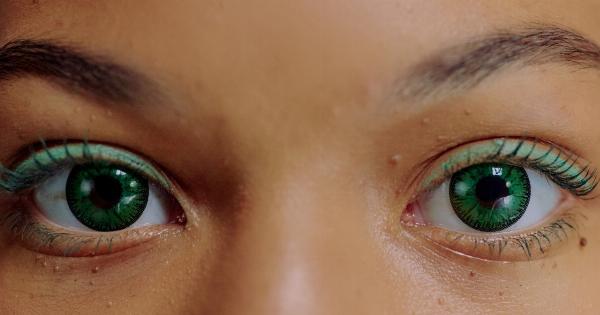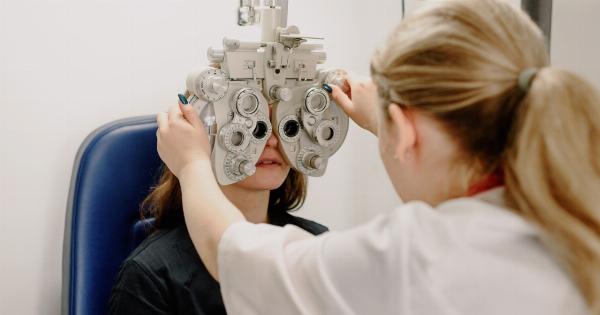Are you one of the millions of people who rely on contact lenses for clear vision? If so, it’s important to be aware of the potential dangers associated with wearing and caring for your contact lenses.
While contacts can greatly improve your eyesight and provide convenience, they can also harbor dangerous bacteria that can lead to serious eye infections.
The Importance of Proper Contact Lens Hygiene
Proper contact lens hygiene is crucial for maintaining both the health of your eyes and the lifespan of your lenses.
Failing to follow the recommended guidelines can result in the buildup of harmful bacteria on your lenses, which can then transfer to your eyes and cause infections.
What Are the Dangers?
The most common and serious eye infection associated with contact lens wear is called microbial keratitis. This condition occurs when bacteria, fungi, or other microorganisms invade the cornea, the clear front surface of the eye.
Symptoms may include redness, pain, blurred vision, and increased sensitivity to light.
In severe cases, microbial keratitis can lead to vision loss or even the need for a corneal transplant.
Additionally, other complications such as corneal ulcers, conjunctivitis (commonly known as pink eye), and giant papillary conjunctivitis (GPC) can also occur due to bacterial contamination of contact lenses.
How Do Bacteria Get on Contact Lenses?
Bacteria can easily find their way onto your contact lenses through various means. Here are a few common ways that contact lenses can become contaminated:.
1. Improper Handling
If you don’t wash your hands thoroughly before handling your lenses, you risk transferring bacteria from your hands onto your lenses.
It’s important to always wash your hands with soap and water and dry them with a clean, lint-free towel before touching your contacts.
2. Topping Off Contact Lens Solution
When you top off your contact lens solution instead of using fresh solution every time, you create an environment that promotes bacterial growth. Always use fresh solution and discard any remaining solution in your lens case.
3. Not Cleaning and Replacing Your Lens Case
Your contact lens case can become a breeding ground for bacteria if not cleaned and replaced regularly. It’s recommended to clean your lens case with sterile solution and let it air dry after each use.
Additionally, replace your lens case every three months or sooner if it becomes damaged or contaminated.
4. Sleeping or Swimming with Contact Lenses
While some contact lenses are approved for extended wear or overnight use, most are not. Sleeping or swimming with your lenses significantly increases the risk of bacterial contamination and infection.
It’s best to follow your eye care professional’s recommendations regarding contact lens wear.
Preventing Bacterial Contamination
The good news is that there are several steps you can take to minimize the risk of bacterial contamination and protect your eyes while wearing contact lenses:.
1. Follow Proper Cleaning and Disinfection Procedures
Always follow the manufacturer’s instructions for cleaning, disinfecting, and storing your contact lenses. Use the recommended contact lens solution and never substitute it with water or saliva, as they can contain harmful microorganisms.
2. Avoid Water Contact
Keep your lenses away from water sources such as showers, pools, hot tubs, and even tap water. Water can contain various bacteria and other contaminants that can adhere to your lenses and cause infections.
3. Replace Your Contact Lenses as Recommended
Contact lenses have an expiration date for a reason. Over time, the material can break down, making the lens more susceptible to bacterial buildup. Replace your lenses as recommended by your eye care professional, even if they still feel comfortable.
4. Don’t Use Expired or Damaged Contact Lens Solution
Expired or damaged contact lens solution may no longer effectively disinfect your lenses, allowing bacteria to thrive. Always check the expiration date on your solution and discard any bottles that are damaged or past their expiration date.
5. Regularly Clean and Replace Your Lens Case
Keeping your lens case clean is essential for preventing bacterial contamination. Clean it regularly with fresh contact lens solution and air dry it upside down to prevent any moisture buildup.
Replace your lens case every three months or if it becomes cracked or damaged.
6. Schedule Regular Eye Exams
Regular eye exams are critical for maintaining the health of your eyes, especially if you wear contact lenses.
Your eye care professional can evaluate the condition of your eyes, check your prescription, and provide guidance on proper contact lens wear and care.
Seeking Prompt Care for Eye Infections
If you experience any symptoms of an eye infection, it’s crucial to seek prompt care from your eye care professional.
They can diagnose the underlying cause of your symptoms and prescribe appropriate treatment, which may include antibiotics or antifungal medications.
Conclusion
While contact lenses can be a convenient and effective form of vision correction, it’s important to prioritize proper hygiene and care to prevent the buildup of dangerous bacteria.
By following the recommended guidelines for cleaning, disinfecting, and handling your lenses, you can protect your eyes from debilitating infections and maintain healthy vision.





























